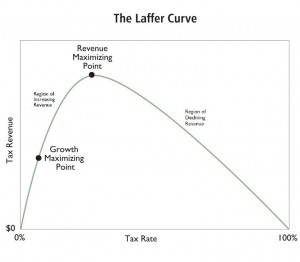Our lords and masters in Washington have taken a small step in the direction of recognizing the Laffer Curve.
Here are some details from a Politico report.
Here’s one Republican victory that went virtually unnoticed in the slew of budget votes last week: The Senate told the Congressional Budget Office it should give more credit to the economic power of tax cuts. It won’t have the force of law, but it was a big symbolic win for conservatives — because it gave them badly needed moral support in an ongoing war to get Washington’s establishment number crunchers to take their economic ideas more seriously. The amendment endorsed a model called “dynamic scoring,” which assumes that tax cuts will pay for at least part of their cost by generating more economic activity. The measure by Sen. Rob Portman (R-Ohio) called on CBO and the Joint Committee on Taxation to include “macroeconomic feedback scoring” in all future estimates of tax legislation. …Portman eked out a narrow 51-48 victory in the final series of budget votes that started around 3 a.m. on Saturday.
Just in case you missed it, this modest victory for common sense took place in the Senate. You know, the place controlled by Harry Reid of Cowboy Poetry fame.

Find Phil Mickelson
To be sure, it’s not quite time to pop open the champagne.
The vote was a symbolic victory for the think tanks and lawmakers on the right who have been fighting for years to force CBO and JCT to officially endorse the idea that people spend more and invest more when they owe the government less. …Conservatives’ ideas, including revenue-generating tax cuts and a more market-oriented health care system, can only work if tax policy changes people’s behavior — and that’s just not how CBO views the world.
I’ve been very critical of both CBO and JCT, so I’m one of the people in “think tanks” the article is talking about.
